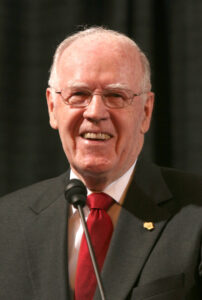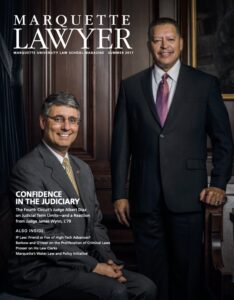Remembering President Lovell’s Leadership on Water Issues
On September 19, 2014, Dr. Michael R. Lovell delivered his inaugural address upon taking office as Marquette University’s 24th president. That day Dr. Lovell announced that Marquette would expand its role in the water sector, encouraging Marquette faculty, staff, and students to develop water solutions “that will change the world.” This was not an isolated commitment; it extended Dr. Lovell’s history of strong support for water initiatives and continued during the decade he spent at Marquette’s helm.
With the news of his untimely passing last week, my purpose here is to reflect on the significant legacy Dr. Lovell leaves behind in the water sphere, as most recently embodied in Marquette’s evolution as a center for work aimed at helping to solve the world’s water problems.
Today, the growth in Marquette’s interdisciplinary water research team evidences the university’s unwavering commitment to the subject. The group includes faculty members from a variety of disciplines including biology, economics, education, engineering, law, and political science. Its members have expertise in water and wastewater treatment technologies, stormwater management, materials and sensors, sustainable and resilient communities, water law and policy, hydrology, and many other areas.
Dr. Lovell was always proud to mention the interdisciplinary projects the team was pursuing, often making it a point to note how many different academic units were involved from across campus under the guiding hand of Dr. Jeanne Hossenlopp, Vice President for Research and Innovation. Most recently, the water group secured Marquette’s largest ever federal award for water research, a large-scale interdisciplinary research partnership with the United States Army Corps of Engineers to promote healthier environments for both military personnel and civilians.
Of course, these research efforts are only one aspect of Marquette’s commitment to water innovation. The university also has become a leader in water education, sustainability, and community engagement and partnerships. It is training future generations of water leaders in a variety of academic disciplines.
Some of this work had been ongoing prior to Dr. Lovell’s arrival at Marquette, such as the formation of the Water Quality Center in the College of Engineering and the Law School’s active engagement in the Milwaukee regional water initiative since its creation in the early 2000s. But with Dr. Lovell’s call—and challenge—to all units of the university for greater engagement with matters involving water, these efforts flourished. For example, the Law School announced an expanded Water Law and Policy Initiative that now offers students a wider suite of courses and fieldwork opportunities, regularly hosts public events and conferences, and pursues independent and funded research opportunities.
A discussion of Dr. Lovell’s water legacy would be incomplete without mentioning his work prior to his arrival at Marquette. As chancellor of the University of Wisconsin-Milwaukee, he was a driving force behind the establishment of The Water Council, a key Milwaukee-based organization dedicated to establishing the region as a global hub dedicated to solving critical water challenges. Also under Dr. Lovell’s leadership, UWM announced a plan to create the nation’s first School of Freshwater Sciences.
In closing, it seems appropriate to mention that President Lovell’s focus on water issues was likely rooted in his strong Catholic faith. He often was interested in discussing Pope Francis’s encyclical letter confirming that water is “a fundamental right” that is “indispensable to human life,” and calling for engagement in an “open and respectful dialogue” about water policies, laws, and technologies. Dr. Lovell also signed the St. Francis Pledge, committing Marquette to join many other academic institutions recognizing a duty to care for the environment and protect the poor and vulnerable, among other things. With Dr. Lovell’s passing, it is up to us to steadfastly carry on this important work.


 A week and a half ago, the Law School held our annual Alumni Awards Reception and Conferral—always a highlight of our year. For it enables us to celebrate Marquette Law School’s spirit and ideals by recognizing four exemplars of the genus (or perhaps it’s the species) of the Marquette lawyer.
A week and a half ago, the Law School held our annual Alumni Awards Reception and Conferral—always a highlight of our year. For it enables us to celebrate Marquette Law School’s spirit and ideals by recognizing four exemplars of the genus (or perhaps it’s the species) of the Marquette lawyer.